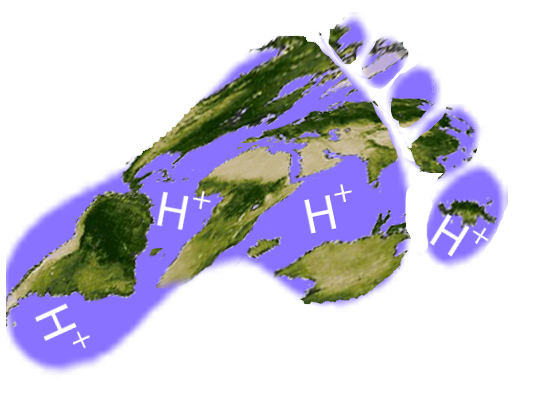
In addition to the famous impacts of atmospheric carbon on global warming, there is an equally worrisome effect of carbon dioxide on the oceans: ocean acidification (or OA for short). Here at I2SEA we have a series of resources about OA, including Our Acidifying Ocean, which is an introductory activity and virtual lab (note: now mobile compatible!).
A student suggested that we start a conversation topic about OA, and here it is! Have you heard about Ocean Acidification? If so, are you worried about it? How do you think we can best raise awareness about it among your fellow students and the general public? Have you seen particularly good links or films about OA that you would like to share? What are you doing to address the problem?
Ocean Acidification >
Ocean Acidification

What is ocean acidification? Well, for starters, it is the ongoing decrease in the pH of the Earth's ocean. This is caused by the uptake of carbon dioxide in the atmosphere. This topic is important to the carbon footprint because it’s caused by all the carbon dioxide. When taking the survey, it gave us numbers that show how much carbon dioxide we produce throughout the things that we do. These things include any type of transportation, what kind of food you eat, how often you use energy in your house depending on if it’s gas or electric, and the things you buy. Bad things could happen to our waters if we don’t make an attempt to prevent ocean acidification. For example, the first thing that affects us is that we won’t be able to swim in the ocean. The second example is that these changes can affect seafood supplies and the ocean's ability to store pollutants, including future carbon emissions. You may ask, “what are some ways that we could prevent this though?” Well, even living in the midwest away from oceans, reducing the amount of carbon dioxide emissions at home, at the office, and on the road can still help with the problem. The carbon dioxide that we as humans release comes from burning fossil fuels. When we do that, it increases the acidity in the ocean allowing carbon dioxide to dissolve. The best things to do in a home that helps decrease the amount fossil fuels being burned include, swapping your furnace for a heat pump (many people in Canada rely on fossil fuels to heat homes), replacing your gas water heater with a heat pump water heater, trading your gas stove for an induction stove, and replacing your gas fireplace with an electric one. You can also use LED lights in the house that helps with the amount of energy being used. More things that people can do include turning off lights, computers, televisions, video games and other electrical equipment when you're not using them, limiting the use of air conditioning, and trying to use more things that take electricity instead of gas, like cars or stoves. These are all easy ways that humans can prevent ocean acidification. The hard thing is trying to get multiple people to go to beaches and pick up all the litter and trash people are throwing and letting dissolve into the ocean and atmosphere. For many years, people have been trying to get others to quit littering, lawmakers have even tried to make it illegal, but that doesn’t stop everyone. Although, the less people emitting fossil fuels, the better. Overall, if more people make an effort to do these things, then the ocean will be thriving again and coral reefs will stop fading in color.





